Oakland, L.A., & New York Memorials for Yuri Kochiyama
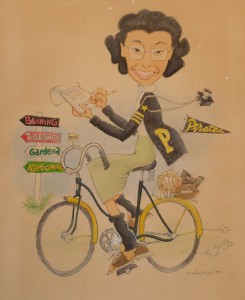
Poster of Yuri Nakahara from high school, where she covered San Pedro High’s sport events for the San Pedro News Pilot as an unpaid reporter.
Two Yuri Kochiyama Memorials during Black August
It is symbolic that two Yuri Kochiyama Celebrations-of-Life took place during the month of August. August was designated “Black August” in the early 1970s in honor of the fallen Black freedom fighters who sparked the revolutionary prison movement. Honoring Jonathan Jackson, George Jackson, William Christmas, James McClain and Khatari Gaulden, Black August has grown to commemorate Nat Turner’s slave rebellion of 1831, the birth of the Underground Railroad in 1850, the March on Washington in 1965, the birth month of Marcus Garvey, Fred Hampton, and Mutulu Shakur, and the month that WEB DuBois passed away, just to name a few. The significance of two Yuri Kochiyama memorials occurring during Black August speaks to the mainstay of her lifelong activism—U.S. political prisoners, especially African Americans.
On August 3, Oakland’s Scottish Rite Auditorium was the site of Yuri’s first Celebration of Life, as she spent the remaining years of her life in Oakland. 700 people, including family, friends, and her countless admirers, gathered for a two-hour program emceed by Warren Furutani. Some of the main highlights of the program were her son Eddie Kochiyama, who shared what it was like growing up with Yuri, Charlie Chin sang “Song for Aichi,” Nobuko Miyamoto read an impassioned letter from Mutulu Shakur (prison inmate for 28 years, world reknown for his successful use of acupuncture for drug detoxification), Somei Yoshino Taiko, dance, clips from three films that featured Yuri, and her New York great grandchildren—Leilani, Malia, Kenji, and Kai. Angela Davis’ tribute recounted what Yuri has meant to U.S. political prisoners, detailing Yuri’s personal qualities that have distinguished her as a life-long activist. Heartfelt tributes and remembrances from Karl Jagbandhansingh, Greg Morozumi, Peggy Saika, and Arisika Razak along with a jazz group featuring Kim Nalley on vocals singing “I Wish I Knew How It Would Feel To Be Free,” and a jazz/taiko number “Forever Yuri Blues” (Akira Tana, Bob Kenmotsu, Mark Izu, Tammy Lynne Hall, and Kenny Endo). Oakland bid farewell to Yuri with renewed inspiration to continue the never-ending work for social justice.
On August 31, the Aratani Theater of the JACCC (Japanese American Cultural and Community Center) was the site of LA’s celebration of life for Yuri. About 500 people gathered, including Yuri’s San Pedro relatives. Emceed again by Warren Furutani, LA’s program featured Aiko Yoshinaga-Herzig and Bibi Angola who gave remembrances of their many years of friendship and activism with Yuri in New York City. Musical tributes by Maceo Hernandez and ELA Taiko, Scott Nagatani and friends, Nobuko Miyamoto and friends, and June Kuramoto; Tracy Kato-Kiriyama gave a spoken word tribute, a video by Tad Nakamura featuring the Blue Scholars “I Wanna Be Like Yuri Kochiyama,” and a touching grandchildren statement given by Ryan Kochiyama. Eddie K. opened the program and Tommy K. gave the closing remarks.
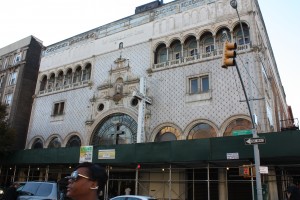
The First Corinthian Baptist Church in New York City’s Harlem was the site of the final Celebration of Life for Yuri Kochiyama, September 27, 2014.
Final Harlem Celebration-of-Life
September 27 was the final farewell celebration-of-life at the First Corinthian Baptist Church in Yuri’s beloved Harlem of New York City. Emceed by Jamal Joseph, Yuri’s two eldest grandchildren Akemi and Zulu opened and closed the program. A special highlight was the tribute given by Attallah Shabazz, Malcolm X’s first daughter, who recounted seeing Yuri rush to the stage to keep Malcolm’s head from touching the floor, while grown men ran in the other direction. She was emotionally moved and her tribute signified the strong connection that will forever link the Kochiyama and Shabazz families.
Tomie Arai, Peter Wong, and Lumumba Akinwole-Bandele all gave uplifting remembrances of the role Yuri has played in different communities while an array of performers gave energizing performances (Soh Daiko, Taiyo Na and Magnetic North, Janice Robinson, Pua Ali’i’llima o Nuioka, and Jamal Joseph and Impact Repertory.) The celebration was especially bittersweet as granddaughter Akemi Kochiyama-Sardinha asked for a moment of silence for Herman Ferguson (longtime Harlem activist), Herman Lew (filmmaker and CCNY professor), and Wayne Lum (David Wong Support Committee), all close friends of Yuri who had passed recently.
All three programs drew out an array of people spanning perhaps five generations that were all touched by Yuri’s life work. Each gathering reunited many folks and deepened the ties to Yuri’s legacy of revolutionary struggle and human rights activism.
New Amerasia explores production of Asian American culture, politics across media platforms
New media platforms are providing novel avenues of inquiry into what it means to be Asian American. Guest edited by Victor Bascara (UCLA) and Lisa Nakamura (University of Michigan), the latest Amerasia Journal, Issue 40:2 “Asian American Cultural Politics Across Platforms,” is a path-breaking exploration of the relationship between Asian American Studies and the emerging field of platform studies. Covering a wide range of media, from conceptual art to music video, photography to video gaming, “Asian American Cultural Politics Across Platforms” engages the most contemporary forms of cultural representation and how they shape the identities of their consumers and users.
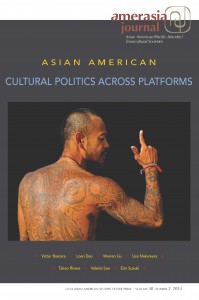 Prompted by the guest editors’ goal to call attention to “new scholarship in Asian American Studies that takes platforms into consideration” in our post-digital era, the special issue asks how Asian American culture and politics are increasingly shaped by new media across real and virtual environments. Valerie Soe’s contribution examines how three Asian American artists confront ingrained inequalities in the art world, challenging stereotypes of Asian American identity in thought-provoking and provocative ways. Similarly, Warren Liu revisits Tseng Kwong Chi’s Mao suit photography series and reimagines how the iconic images represent Chineseness as a reflection of American and Western anxieties over China.
Prompted by the guest editors’ goal to call attention to “new scholarship in Asian American Studies that takes platforms into consideration” in our post-digital era, the special issue asks how Asian American culture and politics are increasingly shaped by new media across real and virtual environments. Valerie Soe’s contribution examines how three Asian American artists confront ingrained inequalities in the art world, challenging stereotypes of Asian American identity in thought-provoking and provocative ways. Similarly, Warren Liu revisits Tseng Kwong Chi’s Mao suit photography series and reimagines how the iconic images represent Chineseness as a reflection of American and Western anxieties over China.
The special issue goes beyond these art forms and delves into other creative realms. Erin Suzuki interrogates East-West power dynamics in a comparative analysis of Psy’s “Gangnam Style” music video and Jessica Hagedorn’s novel Dogeaters, as she focuses on how references to pop culture cited in each index a global pecking order on both cultural and economic terms. Takeo Rivera tackles the issue of Orientalist stereotypes as they appear in the best-selling video game Deus Ex: Human Revolution, as he delves into the ambivalence of Asian gamers who might feel both pleasure and trauma in annihilating the game’s virtual Asian bodies. Loan Dao, on the other hand, considers how youth culture and social networking enable political praxis, detailing how Southeast Asian American youth have embraced and engaged with hip hop culture to advocate for immigrant rights.
The special issue marks the passing of civil rights pioneer Yuri Kochiyama with a personal tribute by Mary Uyematsu Kao. Also featured in the issue are a community spotlight on Los Angeles-based media arts institution Visual Communications and reviews of Lucy Burns’s Puro Arte, Stephen Sohn’s Racial Asymmetries, and other recent publications.
Published by UCLA’s Asian American Studies Center since 1971, Amerasia Journal is regarded as the core journal in the field of Asian American Studies.
ORDERING INFORMATION:
You can purchase a copy of the journal online via the AASC Press store at http://commerce.cashnet.com/aasc.
Copies of the issue can also be ordered via phone, email, or mail. Each issue of Amerasia Journal costs $15.00 plus shipping/handling and applicable sales tax. Please contact the Center Press for detailed ordering information.
UCLA Asian American Studies Center Press
3230 Campbell Hall | Los Angeles, CA 90095-1546
Phone: 310-825-2968 | Email: aascpress@aasc.ucla.edu
Blog: http://www.amerasiajournal.org/blog/ | Facebook: http://www.facebook.com/AmerasiaJournal
Amerasia Journal is published three times a year: Spring, Summer/Fall, and Winter. Annual subscriptions for Amerasia Journal are $99.00 for individuals and $445.00 for libraries and other institutions. Instructors interested in this issue for classroom use should contact the above email address to request a review copy.
Memorials for Yuri Kochiyama in Los Angeles and New York
Please join the Kochiyama Family at the Los Angeles and New York memorials
MEMORIALS FOR YURI KOCHIYAMA:
-LOS ANGELES
August 31, 2014 (Sunday)
2:00 – 4:30 pm
Aratani/ Japan America Theatre
244 South San Pedro Street (bet. 2nd & 3rd Sts.)
Los Angeles, CA 90012
-NEW YORK
September 27, 2014 (Saturday)
5:00 – 7:30 pm
First Corinthian Baptist Church
1912 Adam C. Powell Boulevard
New York, NY 10026
Thank you everyone for all of your support! Feel free to share this post.
August 3rd Celebration of the Life of Yuri Kochiyama
August 3, 2014 the Scottish Rite Auditorium was the site of the Kochiyama family’s Celebration of Life for their mother, grandmother, and great-grandmother, Yuri Kochiyama. A heartfelt program of speakers, musicians, poets, and family brought together hundreds of folks whose lives had all been touched and changed by Yuri. The tribute from Angela Davis is posted on Amerasia’s Facebook page: https://www.facebook.com/AmerasiaJournal?ref=hl
Pre-War Japanese in the San Gabriel Valley
2014-2015 Lucie Cheng Prize: Call for Nominations
Amerasia Journal invites faculty to nominate exceptional graduate student essays (masters and doctoral level) in the interdisciplinary field of Asian American and Pacific Islander Studies for the 2014-15 Lucie Cheng Prize. The selected article will be published in Amerasia Journal, with a $1,500 prize to be awarded to the winner.
The Lucie Cheng Prize honors the late Professor Lucie Cheng (1939-2010), a longtime faculty member of UCLA and the first permanent director of the UCLA Asian American Studies Center (1972-1987). Professor Cheng was a pioneering scholar who brought an early and enduring transnational focus to the study of Asian Americans and issues such as labor and immigration.
Submission: Nominations must be submitted via email by the graduate advisor by October 1, 2014, with notification to the winner by the end of the calendar year. Current students from any graduate program working in Asian American and Pacific Islander Studies are encouraged to send submissions.
Nominations are to include:
1. Graduate Advisor Name, Title, Institution, and Contact Information
2. Graduate Advisor Recommendation (500-word limit)
3. Graduate Student Brief CV (2 pages)
4. Essay (5000-7000 words) in a MS-Word file, formatted according to the Amerasia Journal Style Sheet; for journal style guidelines, see: http://www.amerasiajournal.org/blog/?page_id=42.
Submit materials and queries to ajprize@aasc.ucla.edu and arnoldpan@ucla.edu.
Yuri Kochiyama’s Spirit Lives On
On June 1, 2014, one of the great champions of human rights passed away at the age of 93. Yuri Kochiyama was one of Malcolm X’s many disciples, carrying on his visions of a better humanity through her daily actions. She pointed the way out of narrow nationalism to internationalism and was possibly the preeminent expert on the history of alliances between Asians and Africans, Asian Americans and African Americans. She challenged Japanese American activists to look beyond World War II concentration camps and reparations. She has left a living imprint for Asian Americans to “Keep expanding your horizon, decolonize your mind, and cross over borders.”
Among Yuri Kochiyama’s notes for her talks to school children about Malcolm X, she wrote: “To live in hearts that are left behind is not to die.” Yuri’s spirit of boundless generosity and fearless acts of revolutionary kindness shine light onto a better world.
The Kochiyama Family has created a Facebook page “Remembering Yuri Kochiyama” https://www.facebook.com/RememberingYuriKochiyama where tributes, photographs, remembrances, and news on public memorials for Yuri are posted. Condolences and donations can be sent to:
The Kochiyama Family
9242 Live Oak Ave.
Temple City, CA 91780
18 Million Rising (18MR) has an online petition to the US Postal Service to create a Yuri Kochiyama stamp: http://act.engagementlab.org/sign/18mr_yuri_stamp?source=18mrfacebook
UCLA AASC publications featuring Yuri Kochiyama—
Passing It On: A Memoir by Yuri Kochiyama, 256 pp. (2004 Gustavus Myers Outstanding Book Award)
“Discover Your Mission: Selected Speeches and Writings of Yuri Kochiyama,” 48 pp (pamphlet, June 1998)
“A Quick Reflection,” Yuri Kochiyama, Amerasia Journal 15:1 (1989): 99-102.
“’Stirrin’ Waters ‘n Buildin’ Bridges: A Conversation with Ericka Huggins and Yuri Kochiyama,” Amerasia Journal 35:1 (2009): 140-167.
Call for Papers: Sport in Asian America
Amerasia Journal Call for Papers
Sport in Asian America
Guest Editors:
Professor Rachael Joo (Middlebury College) and Professor Sameer Pandya (University of California, Santa Barbara)
Publication Date:
Summer 2015
Due Date:
Paper submissions (up to 5,000 words) due August 15, 2014
From basketball leagues in the San Francisco Chinatown of the 1930s and 1940s to Michael Chang and Jeremy Lin, sport has always been an important site for understanding Asian American life. This special issue of Amerasia Journal focuses on how various forces—transnational processes, the contemporary era of globalization, histories of colonialism and imperialism, and U.S. domestic history—have shaped the cultural politics of sport in Asian America. For example, global media operates as a key site for commercial representations of Asianness in America and Americanness in Asia. Transnational sport shapes diasporic politics and reveals the contested and contradictory terrain of nationalisms in Asian American communities. The histories of sport in Asian and Pacific Islander communities are often embedded in the colonial histories that inform the relationship between Asian/American athletes and fans of the sport. Furthermore, sport featuring Asian/American players and teams create a sense of national community and identity in ways that reframe ethnicity and race in North America.
Taking into account the various forces mentioned above, we are interested in papers that address a broad range of possible topics, including but not limited to, Asian American sport and religion, Chinese and Chinese American basketball, gender, global sports icons, Korean and Korean American golfers, mass media, Pacific Islander football and rugby athletes, postcolonial cricket, tennis and golf as “model minority” sports, and transnational soccer.
Submission Guidelines and Review Process:
The guest editors, in consultation with the Amerasia Journal editors and peer reviewers, make the decisions on which submissions will be included in the special issue. The review process involves the following steps:
• Initial review of submitted papers by guest editors and Amerasia Journal editorial staff
• Papers approved by editors will undergo blind peer review
• Revision of accepted peer-reviewed papers and final submission
Papers submitted for this special issue should be approximately 5,000 words in length. We especially welcome interdisciplinary and teachable writings to adopt for courses ranging from cultural studies to communication studies to literary studies as well as Asian American Studies and Ethnic Studies.
Please send papers regarding the special issue on “Sport in Asian America” to the following addresses. All correspondence should refer to “Amerasia Journal Asian American Sport” in the subject line.
Professor Rachael Joo, Guest Editor, rjoo@middlebury.edu
Professor Sameer Pandya, Guest Editor, pandya@asamst.ucsb.edu
Dr. Arnold Pan, Associate Editor, Amerasia Journal: arnoldpan@ucla.edu
View or download the PDF version of the Call for Papers – Sport in Asian America.

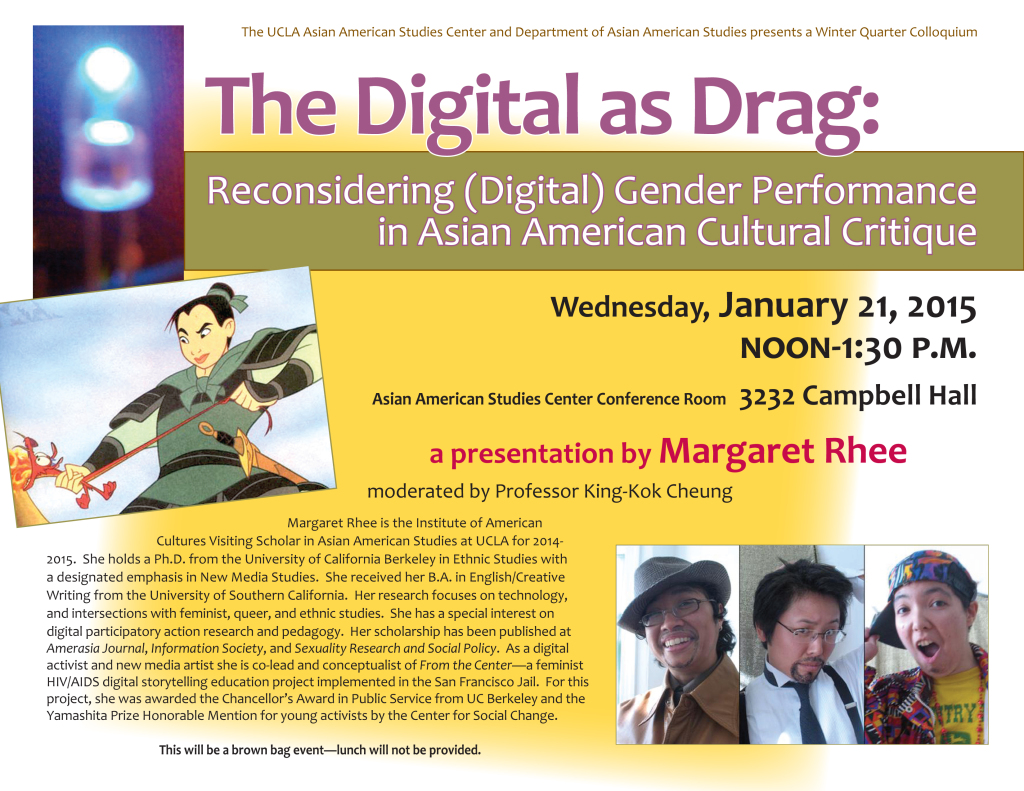
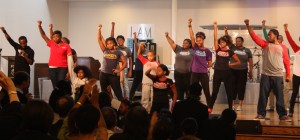
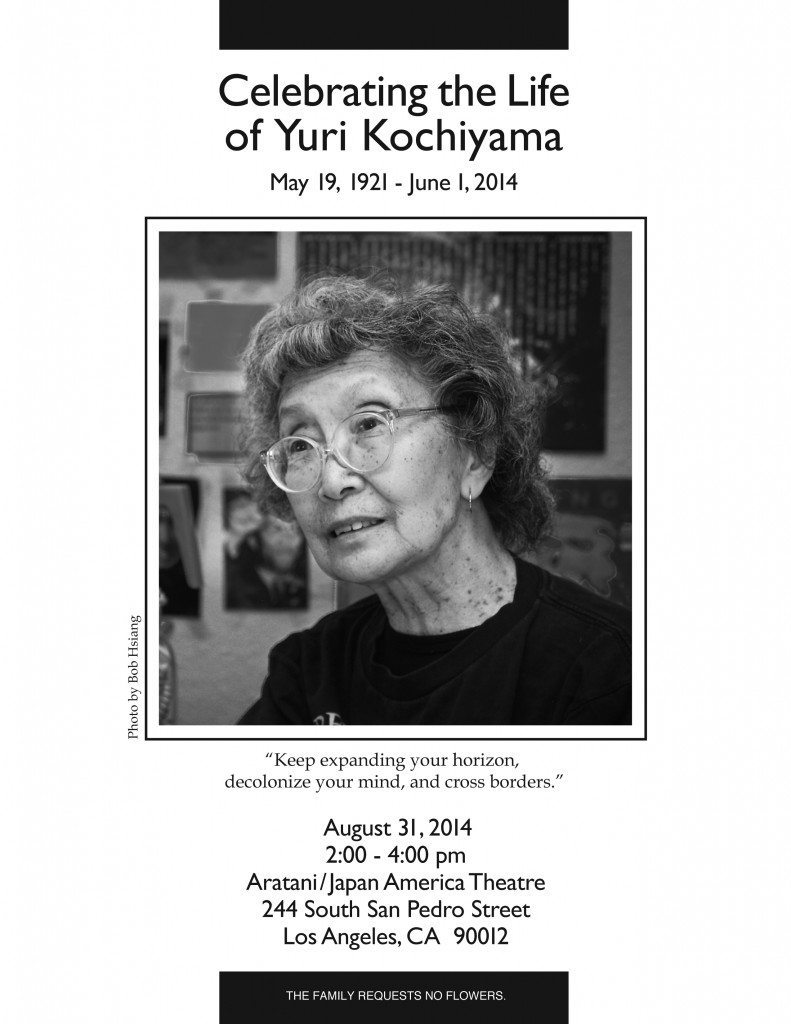
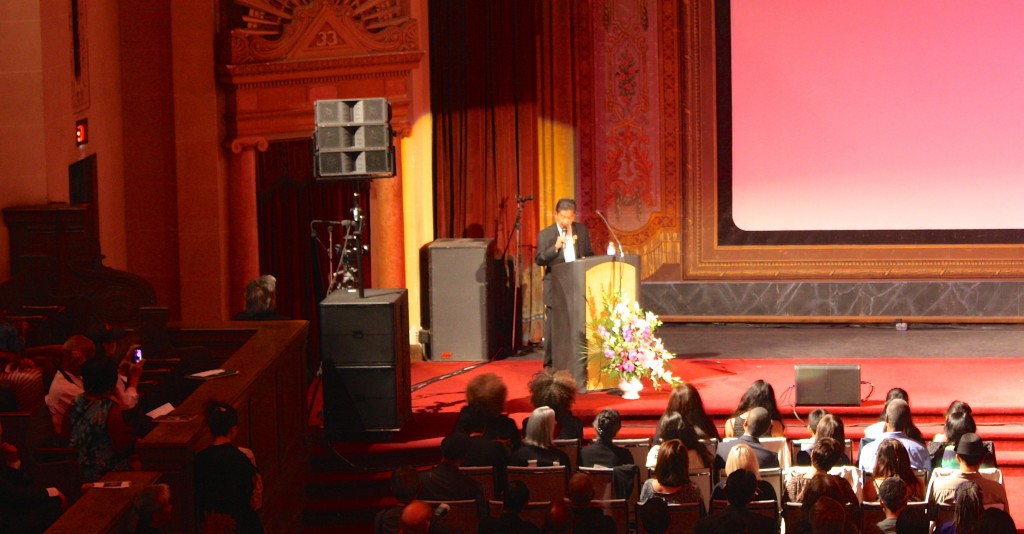
![Triple J Club 1935[5] copy](http://www.amerasiajournal.org/blog/wp-content/uploads/2014/06/Triple-J-Club-19355-copy-1024x522.jpg)
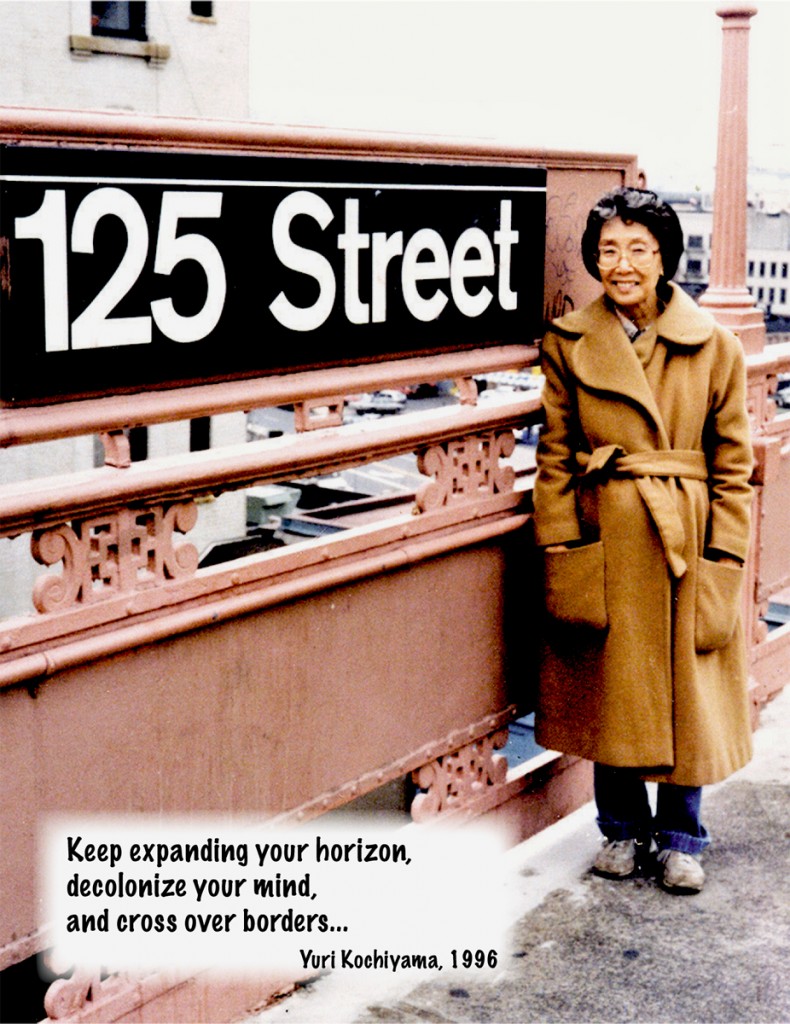
 Amerasia on Facebook!
Amerasia on Facebook!